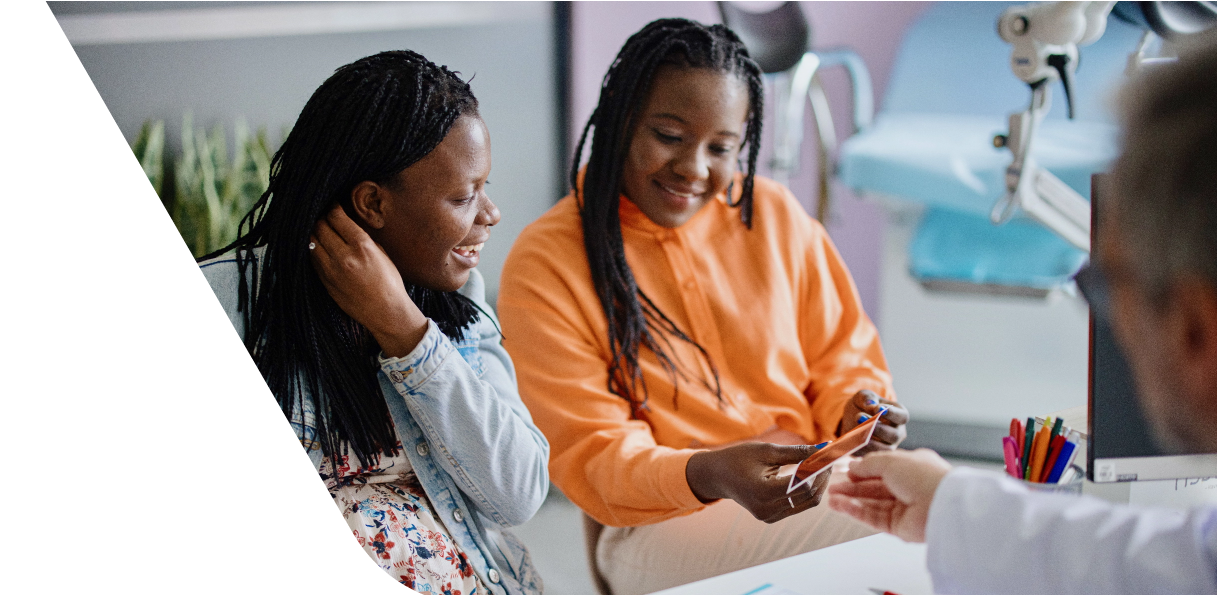SKIP TO CHAPTER

Your pregnancy will be filled with many exciting moments. Out of all of the moments you have to look forward to, your first prenatal visit is one to add to the list. There is no reason to stress out over your first prenatal visit. The purpose of the appointment is mostly just to meet your doctor, discuss your medical background, and talk about any concerns you have on your mind. In short, you’re the star of the show!
The process of your first prenatal visit will be simple, but it’s still a good idea to come prepared. We recommend jotting down a list of questions to ask at your first prenatal visit. By writing down the questions, you can make sure you cover all your bases. Your goal should be to leave the office happy and confident, knowing that you didn’t forget anything!
Not sure what pregnancy questions to ask? Don’t worry, there are a million new moms in the same boat as you! Explore the pregnancy questions below, which address important topics to help you get started.
1.What screenings and tests do I need?
At your first prenatal visit, it’s common for the doctor to perform a physical exam. This physical exam may include a pap smear and ultrasound, amongst other tests and screenings.1 Hearing words like “exam” and “screenings” can be scary, but we promise there is nothing to fear. The exam is solely a preliminary check to make sure it is safe for Baby to arrive. Some of the exam may be general, while other parts may be based on your medical history. Hop down to Question #2 for more on medical history.
2.How will my medical history affect my pregnancy?
Understand your medical history before you make your first doctor’s visit. This means not only understanding your personal medical history, but also your family’s. Most likely, your doctor will ask you questions about your medical history when you visit. These questions may pertain to pregnancy specifically, such as if you’re prone to infertility or miscarriages. They may also cover other topics, such as if you have a history of diabetes, high blood pressure, or other diseases that could affect your pregnancy.2
3.What medications are safe during pregnancy?
Be sure to tell your doctor any and all medications you’re currently taking to find out if they’re safe for pregnancy. Even if you have an idea of whether the medication is safe, it’s always good to double check. Over-the-counter medications are an important consideration too—you’ll want to add any you’re taking (or anticipate you’ll be taking) to your list.
4.What do I need to know about pregnancy diet, exercise, and nutrition?
Health and nutrition needs change during pregnancy, so it’s important to be aware of any changes you might need to make. For instance, you might already know that alcohol is a no-no during pregnancy, but did you know there are certain types of seafood to avoid too, like swordfish and oysters?3 Your doctor should be able to tell you any foods you need to avoid, as well as discuss important nutrients you need, such as folic acid. As for exercise, you can probably still work out during pregnancy (in fact, most doctors recommend it) but check with your doctor first just to make sure.
5.Should I take a prenatal supplement?
While diet is the best to get the essential nutrients you and your baby need, a prenatal supplement can be beneficial as well. Many doctors recommend a supplement during pregnancy because it’s an easy way to fill any nutritional gaps you may have. For example, nutrients like iron or folic acid (mentioned above) are essential during pregnancy.4 A prenatal supplement with these nutrients can help you meet those nutritional needs. When choosing a supplement, look for one with DHA, which can help support your baby’s eye and brain development.
6.Are there any restrictions I need to know about traveling while pregnant?
If you’re a jetsetter, you may want to chat with your doctor to see if there are any travel restrictions you should be aware of when you’re pregnant. Luckily, air travel before week 36 of pregnancy is generally considered safe, so you don’t have to put your bags away in the closet just yet!5 Still, you should check with your doctor and see what he or she advises. This is especially important for international travel, for which you may need to take other precautionary methods, such as getting a vaccine.
7.Who do I contact in case of an emergency?
This pregnancy question is more for peace of mind than anything else. After all, emergencies don’t happen often, but they do occur. It’s smart to have contact information on hand should one occur. Ask about who is available if you need help, along with potential signs of an emergency, such as: severe headache, difficulty breathing, intense abdominal pain, and irregular vaginal bleeding.6 Your doctor will help provide you with the information you need, so that you can leave feeling peace of mind.
We hope that you found these questions to ask at your first prenatal visit helpful. Now, you can walk into you’re first appointment feeling happy, strong, and confident!








